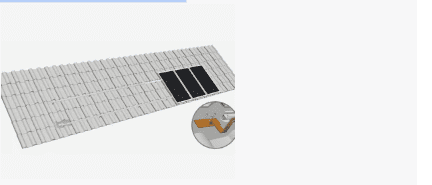Tile roofs are a popular choice for homeowners, offering an attractive and durable option for protecting their homes from the elements. However, if you’re considering installing solar panels on your tile roof, it’s important to understand the different mounting systems available to ensure a safe and secure installation. In this guide, we’ll take a closer look at the different types of tile roof mounting systems and it’s important factors.
What is a Tile Roof Mounting System?
A tile roof mounting system is a set of hardware that is used to secure solar panels to the roof of a tile roof. These systems are designed to withstand the weight of the solar panels and provide a secure attachment that won’t damage the tiles or compromise the integrity of the roof. Here are several different types of tile roof mounting systems available, each with its own unique features and benefits.
Types of Tile Roof Mounting Systems
Tile Hooks
Tile hooks are a popular choice for tile roof mounting systems because they are easy to install and can be adjusted to fit a wide range of tile sizes and styles. The hooks are attached to the roof using screws or bolts, and the solar panels are then attached to the hooks using clamps or brackets. Tile hooks can be installed without penetrating the tiles, which can help to preserve the integrity of the roof.
One of the main advantages of tile hooks is their flexibility. They can be adjusted to fit tiles of different sizes and shapes, making them a versatile choice for a wide range of roofs. Additionally, tile hooks are typically made from durable materials like aluminum or stainless steel, which ensures they can withstand harsh weather conditions and last for many years.
Tile Replacement Mounts
Tile replacement mounts are designed to replace a single tile on the roof and provide a secure attachment point for the solar panel. The mount is installed in the same way as a tile, but it includes a bracket or rail that allows the solar panel to be attached securely. This type of mounting system is ideal for roofs with curved or irregularly shaped tiles that may be difficult to fit with other types of mounting systems.
One of the main advantages of tile replacement mounts is their ability to integrate seamlessly with the existing roof. Because the mount replaces a single tile, it doesn’t require any additional modifications to the roof structure. This can help to minimize the risk of damage to the roof and ensure a clean, professional-looking installation.
Tile Anchor Mounts
Tile anchor mounts are a versatile option for tile roof mounting systems because they can be used with a wide range of tile sizes and styles. The mounts are anchored to the roof using screws or bolts, and the solar panels are then attached to the mounts using clamps or brackets. This type of mounting system is ideal for roofs with flat or low-profile tiles that may not be suitable for other types of mounting systems.
One of the main advantages of tile anchor mounts is their versatility. They can be used with a wide range of tile sizes and styles, making them a flexible choice for a wide range of roofs. Additionally, tile anchor mounts are typically made from durable materials like aluminum or stainless steel, which ensures they can withstand harsh weather conditions and last for many years.
Factors to Consider When Choosing a Tile Roof Mounting System
When choosing a tile roof mounting system, there are several factors to consider to ensure a safe and secure installation. These include:
Tile Type and Size
The type and size of the tiles on your roof will determine which type of mounting system is best suited for your needs. Some mounting systems are more versatile than others and can be used with a wide range of tile sizes and styles, while others may be more limited in their applications.
Roof Pitch and Orientation
The pitch and orientation of your roof will also impact the type of mounting system that is best suited for your needs. For example, roofs with a steep pitch may require a different mounting system than roofs with a low pitch. Additionally, the orientation of your roof (i.e., north-facing, south-facing, etc.) can impact the efficiency of your solar panels, so it’s important to choose a mounting system that can accommodate the optimal panel placement.
Weight Capacity
It’s important to choose a tile roof mounting system that can safely support the weight of your solar panels. Be sure to check the weight capacity of the mounting system before making a purchase, and ensure that it is compatible with the weight of your solar panels and any other equipment you plan to install.
Wind and Weather Conditions
The wind and weather conditions in your area can impact the safety and stability of your tile roof mounting system. Be sure to choose a system that is designed to withstand the wind and weather conditions in your area, and consider adding additional support or reinforcement if necessary.






























